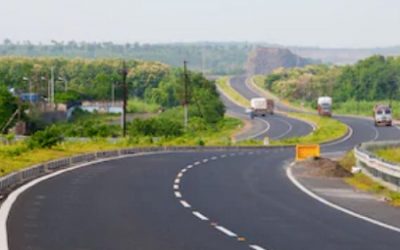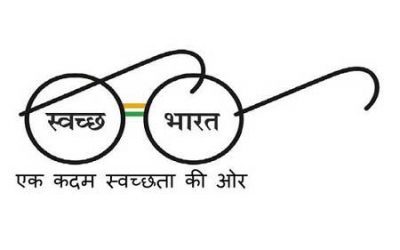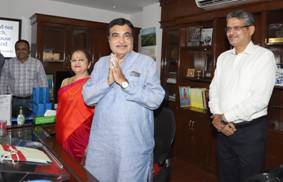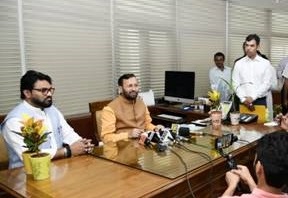Prime Minister Narendra Modi today launched Swachhata Hi Seva (SHS) 2019, a massive countrywide awareness and mobilization campaign on Swachhata in Mathura. SHS 2019, with special focus on ‘plastic waste awareness and management’ is being organized from 11 September to 2 October 2019, as the Swachh Bharat Mission (SBM) is poised to dedicate an ODF India to Mahatma Gandhi on his 150th birth anniversary. The launch of SHS was organized jointly by the central Departments of Animal Husbandry and Dairying and Drinking Water and Sanitation and the Government of Uttar Pradesh.
The Prime Minister also visited the Pashudhan Arogya Vigyan Mela, where he saw cows being operated upon to remove plastic waste from their stomachs. He then interacted with a group of women from Uttar Pradesh who segregate plastic waste into recyclables and non-recyclables, and in a unique gesture, also participated in the segregation activity himself.

Plastic recycling is an important part of global recycling economy, which is currently valued at $317 billion and employees millions of people. Recycled PET can be used to make many new products, including fiber for polyester carpet; fabric for T-shirts, long underwear, athletic shoes, luggage, upholstery and sweaters; fiberfill for sleeping bags and winter coats; industrial strapping, sheet and film; automotive parts, such as luggage racks, headliners, fuse boxes, bumpers, grilles and door panels.
Addressing an audience of about 20,000 farmers, sarpanches, women groups and swachhagrahis, the Prime Minister urged all citizens to free their houses, offices and work space from single use plastic. Drawing people’s attention to the hazardous effects of such plastic for the environment, and for the health of animals and aquatic life, he reiterated his appeal to use cloth or jute bags while going out for shopping and to use metal or earthen glasses for serving water in offices. He asked people to collect all the plastic waste from their surroundings at an identified place and to ensure its safe disposal with the support of the local administration during the Swachhata Hi Seva.
Chief Minister of Uttar Pradesh, Yogi Adityanath applauded the positive impacts of the SBM and highlighted the contribution of SBM in dealing with the menace of deadly disease Encephalitis in eastern UP. He added that the significant increase in the sanitation coverage under SBM will now be leveraged for achieving the goal of plastic waste free India on the lines of ODF India.
Gajendra Singh Shekhawat, Union Minister of Jal Shakti said that the entire world is eagerly waiting for the day when India becomes ODF. He said that the SHS 2019 campaign would give a big boost to generate mass awareness on plastic waste and its subsequent collection, recycling and disposal, and will be a new Jan Andolan for protecting environment under the inspiring leadership of the Prime Minister.
This year’s Swachhata Hi Seva will see mass awareness generation activities on plastic waste management from 11 September to 1 October; nationwide Shramdaan for plastic waste collection and segregation on 2 October; and recycling and effective disposal of the collected plastic waste from 3 October to 27 October 2019 (Diwali). The Prime Minister has also written personal letters to all Sarpanches and Swachhagrahis, motivating them make the Swachhata Hi Seva 2019 a grand success. These letters were read out today at special Gram Sabhas across the country.
The aim is to equip masses with the knowledge to distinguish between recyclable v/s non-recyclable plastics. The govt. plans to eliminate the use of non-recyclable plastics such as poly bags, straws/stirrers, thermocol decoration, plastic cups etc. and promote the collection and recycling of PET bottles (water/oil/juice/cola bottles), HDPE containers (shampoo/conditioner bottles) to generate revenue and lakhs of jobs for our nation.
The logo of this year’s ‘Swachhata Hi Seva’ mission depicts a plastic bottle and a human hand inside of a recycling sign, denoting shraamdan for plastic recycling to promote circular economy to generate revenue and lakhs of jobs for our nation. The plastic PET bottle is included in the logo since it is the most recycled type of plastic globally.
“The government aims to tackle the plastic pollution issue by weeding out its roots. Technically, all plastics are recyclable but not everything that’s ‘recyclable’ actually gets recycled. The journey of recycling starts with consumers responsibly segregating and disposing various materials like paper, wood, plastic, metals, debris, glass etc. The next step is to have an effective collection & waste management system in place to send plastic waste to the recycling units. In the absence of a robust waste collection and disposal mechanism, a lot of waste is ending up in landfills and water bodies. The need of the hour is to replace the existing linear economic models with circular economic models to eliminate waste by increasing reusability and ensuring recycling of highly recyclable plastic waste such as small and big plastic bottles. Our country has an army of 40lakh ragpickers, which can be mobilized to make our country a Plastic Waste Free India,” Commented Vinod Shukla, President – Pandit Deendayal Upadhyay Smriti Manch, a national NGO working for the upliftment of ragpickers. He is the nephew of Pandit Deendayal Upadhyay.
The plan is to collect PET bottles through nationwide shraamdan since it is the highest recycled plastic type in India. As per the report released by the National Chemical Laboratory (NCL) – CSIR, the current recycling rate of PET bottles is 80% in India, more than the USA, Japan, Europe, and China. Another 10% get reused in Indian households. This includes PET bottles, containers, and jars with a capacity of 150 ml to 20 liters.
“Plastic, which has been named as one of greatest invention of 21st century, is being defamed as the curse to humanity, since it is a new material compare to metals, glass, which we are using since centuries. The awareness about the use and end-of-life treatment of plastic waste is not well understood amongst key stakeholders hence it is being littered irresponsibly and became a global environmental challenge. But every great challenge comes with a unique growth opportunity and same is the case for plastics, especially for highly recycled plastic types such as PET. The Indian PET bottles recycling generate 3,500 crore annually. The need is to open avenues to ensure the collection and repurposing/recycling/upcycling of highly recycled plastics such as water/juice/cola/oil bottles,” said Sachin Sharma, Director, Gem Enviro Management, which is one of the largest plastic recyclers in India.
Union Minister of Fisheries, Animal Husbandry and Dairying, Giriraj Singh, Minister of State, Jal Shakti, Rattan Lal Kataria, other ministers from the State and local MP and MLAs also participated in the event.














0 Comments